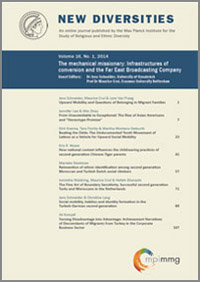OPEN FORUM
From ‘Multiculturalism’ to ‘Interculturalism’ – A commentary on the Impact of De-racing and De-classing the Debate
by Harshad Keval (Canterbury Christ Church University)
Recent discourses surrounding the so-called death or decline of multiculturalism are characterised by a movement towards notions and practices of ‘Interculturality’, ‘Interculturalism’ and what have been called ‘new frameworks’ for diversity and race. The contemporary socio-cultural landscape is characterised by the persistence of racism, both institutionally and interactionally embedded, which is increasingly re-generated on the political European stage. In this paper I argue that more vigilance may be required before a wholesale acceptance of these ‘new frameworks’ is mobilised. The rise of Interculturalism in un-nuanced forms is underwritten by parallel processes of anti-multiculturalism, cultural racism, and the demise of the spaces within which the class-race dialectic can be articulated. Finally, the policy gaze has both racialised the debate on cultural difference using the focus on particular ‘different’ groups, and deemed other black and minority ethnic groups as officially less troublesome. I argue that this economically and politically expedient rendition of the sociocultural landscape leads to a distorted analysis of differential subjugation. In an apparently ‘post-race’ era of diversity, racialised experiences need to be articulated more richly and with more political weight than interculturalism may currently facilitate.
Keywords: imulticulturalism, interculturalism, race, intersectionality
Suggested bibliographic reference for this article:
Keval, H. (2014). From ‘Multiculturalism’ to ‘Interculturalism’ – A commentary on the Impact of De-racing and De-classing the Debate. New Diversities, 16(2), 125-139. Retrieved [todaysdate] from https://newdiversities.mmg.mpg.de/?page_id=1749
|
